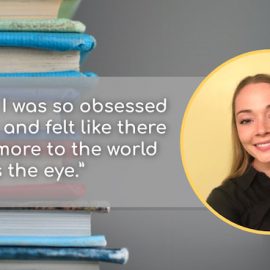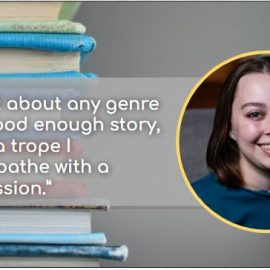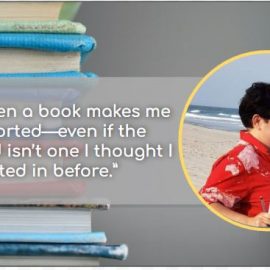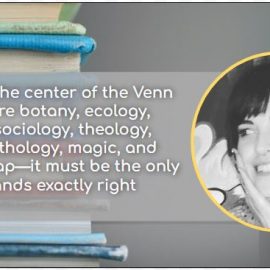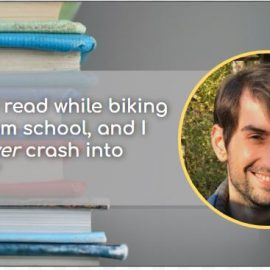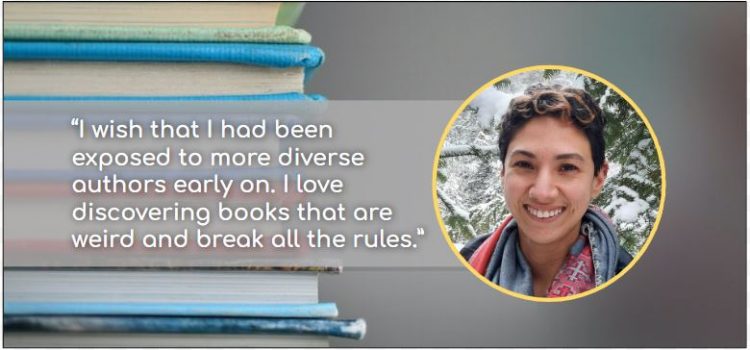
What niche book topics are on Sam’s TBR list? What book makes Sam want to run all the time, every day? What genre have they completely changed their mind about?
Sam is a Shortform book guide writer from Maine. They love authors who don’t think in binaries, and they enjoy reading in hammocks in the woods and learning about food systems.
Our Interview With Sam
Sam grew up reading the classics. But, as they got older, they discovered a whole new world of rule-breaking books. Here’s what Sam had to say about their reading habits over the years.
What’s your favorite book and why?
A truly impossible choice, but I’ll do my best to narrow it down.
Braiding Sweetgrass by Robin Wall Kimmerer is one of my favorites because of the way she describes her connection to plants and a love for plants that’s shaped by botany, science, ancestral lineages of medicine making, and this sort of ineffable spiritual connection to plants that comes from spending time with them. People tend to think in terms of binaries—like, plant people are either scientists or hippie/witchy tree-hugger types—and I’ve always thought of myself as a bit of both. So, I love that she brings all of those things together through her essays.
Another more recent favorite is House of the Spirits by Isabel Allende. I love how the story jumps from one generation to the next, the magical realism, the blunt foreshadowing, the politics, the heartbreak, all of it! After reading it, I also realized how many other writers I love were influenced by her work and her narrative style—like Kali Fajardo-Anstine’s Woman of Light and Gabriela Garcia’s Of Women and Salt. It makes me wish I’d gotten to read more books by Latina authors as a young person!
One Hundred Nights of Hero by Isabel Greenberg is an absolutely hilarious graphic novel that’s very dear to me. It’s got a really cool, kind of creepy art style, and it’s a spin-off—not sure if that’s the right term—of the One Thousand and One Nights story starring two lesbian lovers. It’s also an ode to storytelling, and I love oral storytelling as an art form, particularly telling weird, old, dark tales.
Some of my favorite political books are Open Veins of Latin America by Eduardo Galeano and books of interviews with Subcommander Marcos of the Zapatista movement in Mexico. I found those, and some of my other favorite books, while living on a remote farm in the mountains of Costa Rica. There was this really amazing little library created mostly with books that people left there when they came to the farm to work or visit. I discovered a lot of gems in that library that really impacted me.
What’s on your reading list these days?
I’m slowly making my way through everything Octavia E. Butler has ever written, and, most recently, her Patternmaster series. I’m completely fascinated, disturbed, and entranced by the worlds she creates. Next on my list is Foodtopia by Margot Anne Kelley—a non-fiction book about historical back-to-the-land movements in the U.S., starting from the 1840s up to now. As a farmer and someone who cares a lot about food sovereignty and land access, I’m always interested in books about food systems and reimagining our relationship with food.
If you could have a dinner party with any three authors—dead or alive—who would they be and why?
Octavia E. Butler, so I could ask her about what happens next in the storyline of her last book published before she died, Fledgling! She usually wrote in series, and I’m dying to have more from that story. Also, John Paul Brammer, because he’s hilarious and I think it would be a hoot. And someone really wise whom I could get advice from, like Audre Lorde.
What’s your favorite genre? Why does it intrigue you?
Though I haven’t read any for a while, I really love essay collections and short story collections. I’m so amazed by writers who can paint an entire world, get me attached to a character, or leave me stunned, moved, cracking up, or thinking about an idea all day, just from a handful of pages. Some of my favorite short story writers and essayists are Samanta Schweblin, Carmen Maria Machado, Terry Tempest Williams, Esmé Weijun Wang, Samantha Irby, and Roxane Gay.
Are there any book genres or tropes that you dislike or refuse to read?
Not really that I refuse to read. I’m not that excited about business books because I’d rather spend time thinking about more interesting things than money. But, I think most books have something valuable to offer, even if it’s just understanding another viewpoint that you don’t necessarily agree with.
What’s your favorite way to read a book?
In the warm seasons, definitely in the woods in a hammock with a physical book, ideally. That way I can pause to stare at trees and critters and enjoy the ambiance. In the cold season, which is long where I live in Maine, cozied up with my dog, near the woodstove, warm beverage in hand!
How have your reading tastes changed over the years?
I feel like my reading tastes have just expanded the more I get older. In school, I mostly read the “classics,” and I wish that I’d been exposed to more diverse authors early on. I love discovering books that are weird and break all the rules. Like, I read Several People Are Typing by Calvin Kalsulke last year—an entire book written in the form of Slack messages. It was so weird and so funny, and I didn’t know it was possible, but I loved it.
Do you have any guilty pleasure books?
I used to turn up my nose at the romance genre, and I have to say that I’ve learned to love it as a true art form that people should appreciate more! This revelation is mostly due to Casey McQuiston, who writes such funny and heart-warming romance novels with queer characters—Red, White, and Royal Blue and One Last Stop are good ones. The stories let me completely check out from reality, and it’s honestly just a fun time reading them. So, maybe in the past, romance would’ve been a guilty pleasure, but not anymore!
Have any books you’ve read caused you to make any life changes or to develop any habits?
I’ve read the book Born to Run about four times. And, every time I read it, all I want to do is go on long runs all the time, every day. I’ve always loved running, and the ultrarunners in the story, especially the indigenous Rarámuri runners, are so inspiring to me. So, if you need any inspiration to take up running or to get back into it after a break, definitely read that one.
Are there any lesser-known books that you’ve read that you want others to know exist?
I don’t actually know if this is a well-known book, but Women Who Run With the Wolves by Clarissa Pinkola Estés is an incredible collection of old lore that’s a real gem. The myths come from cultures from all over the world, and it’s so neat to see how archetypes pop up in different regions and across eras. It’s the kind of book you could probably read many times throughout your life and get different bits of wisdom from.
What’s your favorite quote from a book or an author?
Maybe not an all-time favorite, but one I love: “I don’t seek the permission of the Fates to find a soul mate with whom to deploy my melancholy; I can be alone, really alone, but I do ask the god of neural functions to let me retain this faint line of voice that crosses my cranium, allowing me to laugh at the world around me.” (Daniel Saldaña París, Among Strange Victims)
At Shortform, how do you go about working on a book that has viewpoints you don’t agree with?
I approach it as sort of a personal challenge, and the first step is often trying to have compassion for people—even if they have different values or opinions than I do. And then I get to play devil’s advocate a bit and add nuance in the analysis, which I like doing regardless of the topic. I think it’s more interesting to question everything just to see where the thought experiment goes. You learn a lot more that way.
Sam’s Recommended Reading List
- Braiding Sweetgrass by Robin Wall Kimmerer
- House of the Spirits by Isabel Allende
- One Hundred Nights of Hero by Isabel Greenberg
- Open Veins of Latin America by Eduardo Galeano
- Red, White, and Royal Blue and One Last Stop by Casey McQuiston
- Born to Run by Christopher McDougall
- Women Who Run With the Wolves by Clarissa Pinkola Estés
About the Series
At Shortform, we want to give our employees names and faces so you can get to know the people who make the magic happen. That’s why we’re doing the Shortform Reads series, where we interview our employees and share their thoughts and opinions. You can check out more employee interviews here.

